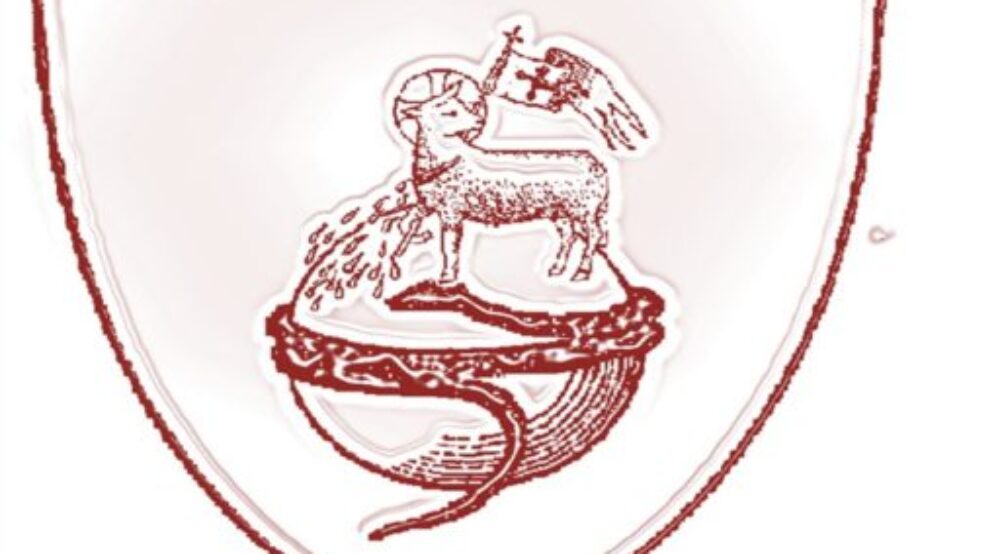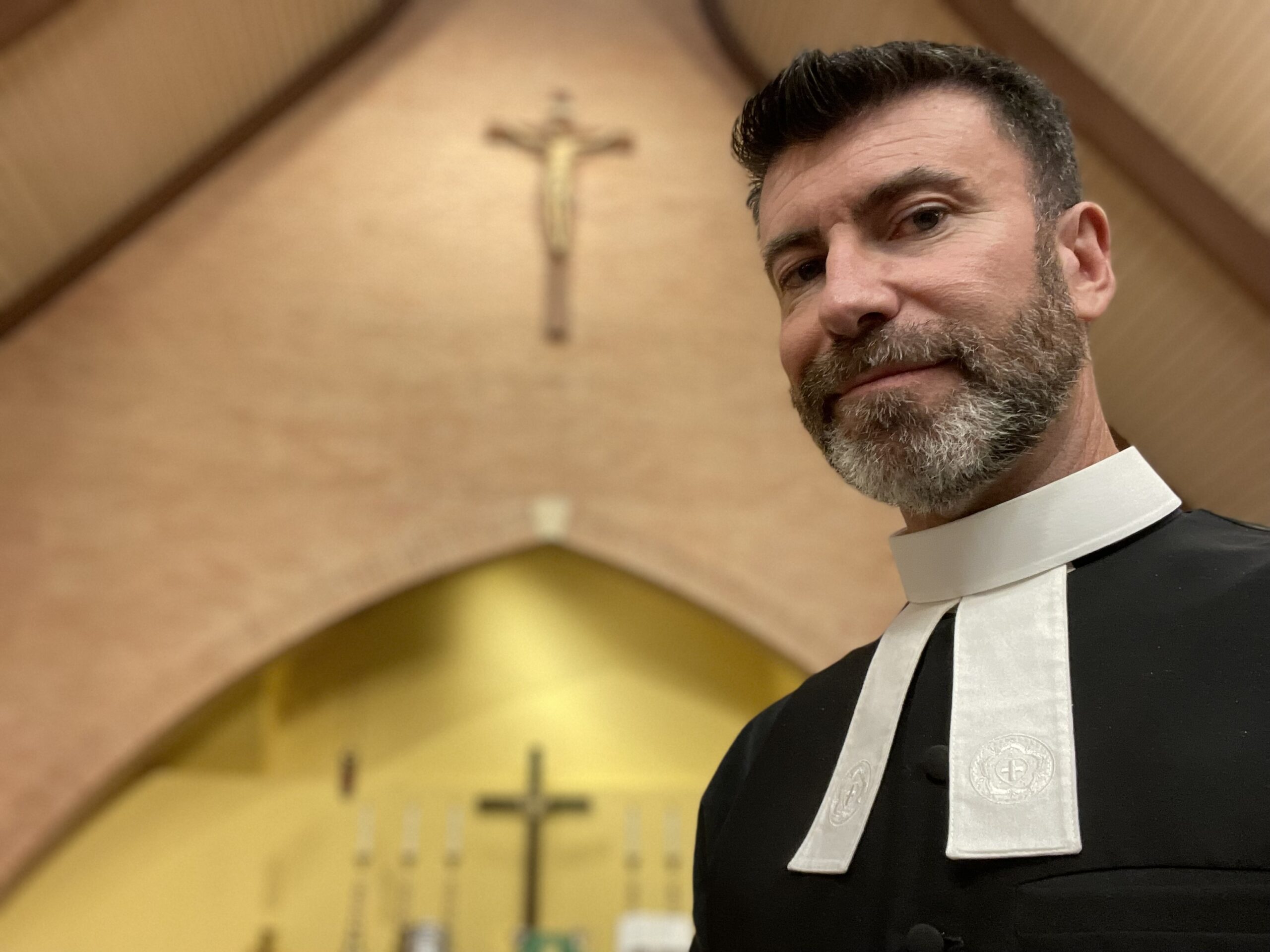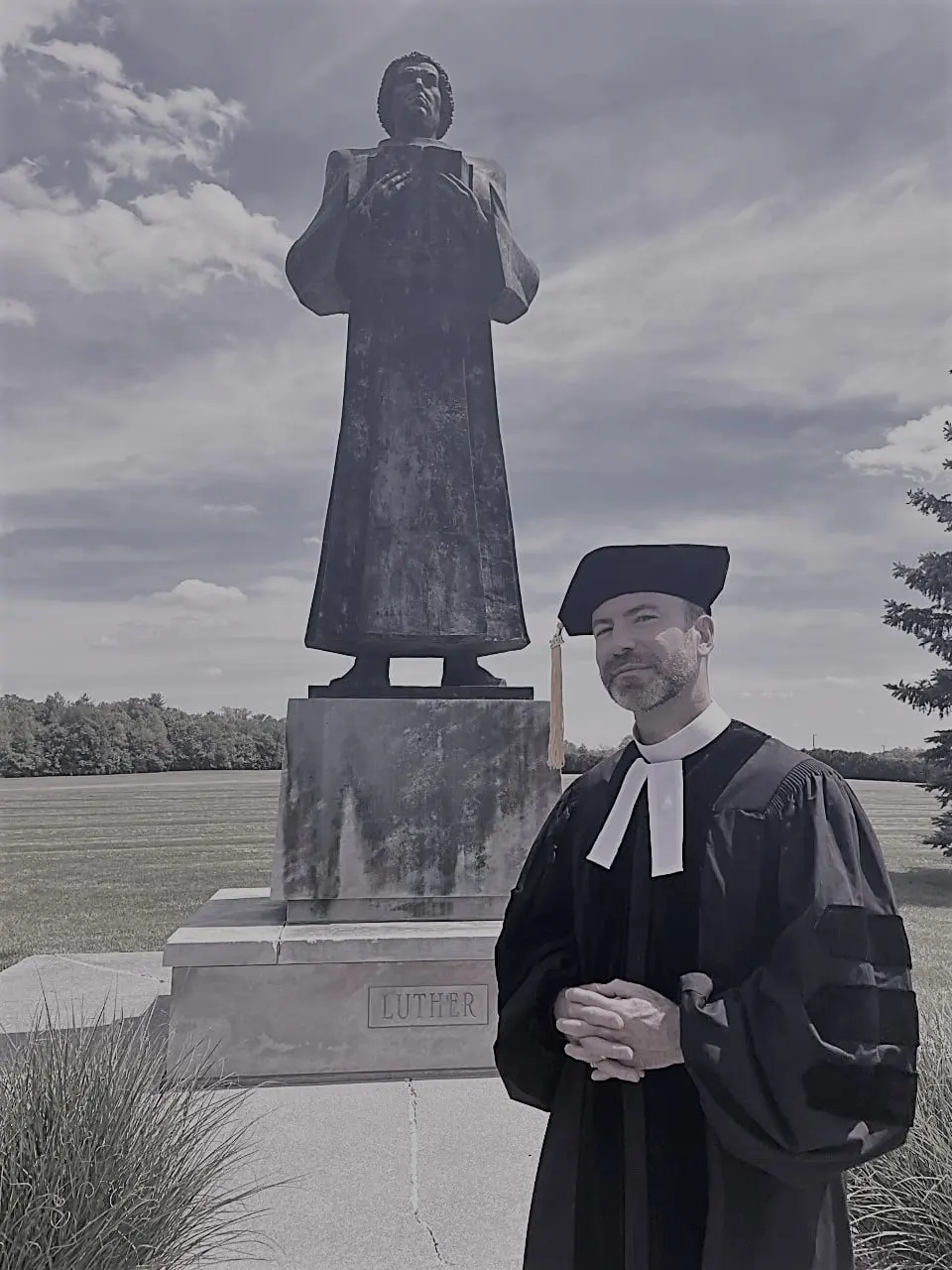Rev. Dr. Brian L. Kachelmeier serves as pastor for the members of Mount Calvary Lutheran Church in San Antonio, Texas.
Originally, he was called out of the seminary to serve as the mission planter for Los Alamos as the Associate Pastor of Immanuel Lutheran Church in Santa Fe, New Mexico. After the mission became a congregation in 2008, he became the first pastor of Redeemer in Los Alamos. He served in Los Alamos for seventeen years. In 2021 he accepted a call to serve at Mount Calvary Evangelical Lutheran Church in San Antonio.
He has a BA in Religious Studies from the University of New Mexico in Albuquerque, New Mexico (1995), an MDiv from Concordia Theological Seminary in Fort Wayne, Indiana (2005), and a DMin from Concordia Theological Seminary (2021) .
He teaches Paideia I – Old Testament Theology and Hebrew for the Wittenberg Academy (www.wittenbergacademy.org). He is the host of the radio show Redeemer Theological Academy, a frequent guest on Issues, Etc. (Issuesetc.org), and Thy Strong Word (www.kfuo.org) radio programs. He speaks at conferences on the topic of Christ in the Old Testament.
He has been married to Andi, his beautiful bride, for nearly thirty years. They were married in 1992 in Albuquerque, New Mexico. He has four children.
Website: www.mtcsa.org
Email: bkachelmeier@mtcsa.org



Thank you pastor for the great work you are doing.Can it be possible for me to be part of you here in Uganda? Gods Blessing to you and your family.
Yes! You can download or listen to these lectures at anytime. If you have a suggested topic for discussion, just let me know.
Pastor Kachelmeier
Hi pastor. As a Lutheran do you believe in baptizing babies?
My other comment is that I really enjoy your information on JWs. I’m captivated by it and god willing i can use to to set a loved one free if it’s god will.
Jonathan,
Thank you for your question. As a Lutheran, I believe, teach, confess that there is one baptism for the remission of sins as we declare in the Nicene Creed. Baptism was instituted by our Lord Jesus Christ. Thus, we must begin our conversation by looking to the place in the Holy Scriptures where Christ has instituted baptism. We find the institution of baptism in the last chapter of Matthew. Christ our Lord speaks to the Apostles and says, “All authority in heaven and on earth has been given to me. Therefore go and make disciples of all nations, baptizing them in the name of the Father and of the Son and of the Holy Spirit, teaching them to keep all that I have commanded you. And behold, I am with you always, to the end of the age.” (Matthew 28:18-20) From this passage, we learn that the Lord sent out the Apostles to make disciples. How are disciples made? Disciples are made by being baptized and being instructed int he words of Jesus.
A disciple is a student who learns from Christ. A disciple is a sheep who hears the voice of the Good Shepherd who laid down His life and took it up again. Christ directly connects baptism to being made a disciple. Now He could have said, “Make disciples by teaching them My words.” Instead, He clearly states that disciples are made by being baptized and being taught His word. Also, Christ makes it clear that disciples are to be made from all nations. There are no restrictions. Christ does not forbidden anyone from being baptized. Both Jews and Greeks are to be baptized. Slave and free are to be baptized. Men and women are to be baptized. Adults and children are to be baptized. Christ has not forbidden the baptism of infants. Christ instituted the sacrament; therefore, we must cling to His institution. Man cannot forbid what Christ has not forbidden.
In fact, that is exactly what the Apostles did when they tried to forbid infants from coming to Jesus. The Holy Spirit reveals this event to us for a reason. St. Luke writes, “Now they were bringing even infants (βρέφος) to him that he might touch them. And when the disciples saw it, they rebuked them. But Jesus called them to him, saying, “Let the children come to me, and do not hinder them, for to such belongs the kingdom of God. Truly, I say to you, whoever does not receive the kingdom of God like a child shall not enter it.”” (Luke 18:15–17, ESV) In the this passage, I have shown you the Greek word “βρέφος”, so that, we can be clear that we are talking about infants. In fact, this is the same Greek word that St. Paul uses when he rejoices that Timothy has believed since the days of being an infant. Paul writes, “But as for you, continue in what you have learned and have firmly believed, knowing from whom you learned it and how from childhood (βρέφος) you have been acquainted with the sacred writings, which are able to make you wise for salvation through faith in Christ Jesus.” (2 Timothy 3:14–15, ESV)
Likewise, Jesus uses the infants being brought to Him as an example of how one is to enter the kingdom of God. Jesus says, “Truly, I say to you, whoever does not receive the kingdom of God like a child shall not enter it.” (Luke 18:17, ESV) Jesus does not use an adult as an example of faith; rather, it is the infant. Faith is a gift from God. Just as an adult cannot make himself believe, an infant cannot make himself believe. Conversion is God’s action in both adults and infants. Thus, Jesus says, “Truly, truly, I say to you, unless one is born of water and the Spirit, he cannot enter the kingdom of God. That which is born of the flesh is flesh, and that which is born of the Spirit is spirit.” (John 3:5–6, ESV) Just as physical birth is not accomplished by the act of the will, spiritual birth is not accomplished by the act of the will. A infant does not decided to be born, just as an infant does not decided to be born from above in the waters of baptism. The Apostle John writes, “But to all who did receive him, who believed in his name, he gave the right to become children of God, who were born, not of blood nor of the will of the flesh nor of the will of man, but of God.” (John 1:12–13, ESV) God is the one who gives us natural birth and God is the one who gives us spiritual birth.
Thus, on the Day of Pentecost when the Apostles began to publicly proclaim the message of the cross, those who heard the word wanted to know what they needed to do to be saved. St. Peter responded, “Repent and be baptized every one of you in the name of Jesus Christ for the forgiveness of your sins, and you will receive the gift of the Holy Spirit. For the promise is for you and for your children and for all who are far off, everyone whom the Lord our God calls to himself.”” (Acts 2:38–39, ESV) Again, we have water and the Spirit at work bringing the new birth. Instead of forbidding infants, Peter makes it clear that the promise tied to baptism is for parents and their children. There are no exclusions.
In baptism, it is God who acts. Baptism is not our action. In fact, we have to passively received baptism from somebody else. Paul tells us that God acts in this way, “The Father saved us, not because of works done by us in righteousness, but according to his own mercy, by the washing of regeneration and renewal of the Holy Spirit, whom he poured out on us richly through Jesus Christ our Savior, so that being justified by his grace we might become heirs according to the hope of eternal life.” (Titus 3:5–7, ESV) In unison with Paul, Peter declares, “Baptism, which corresponds to this, now saves you, not as a removal of dirt from the body but as an appeal to God for a good conscience, through the resurrection of Jesus Christ,” (1 Peter 3:21, ESV) When an infant is baptized, it testifies to the reality that it is God who does the action and not the individual. An infant is brought to the waters by somebody else and receives the gift from God.
Furthermore, St. Paul tells us about God’s action in baptism in this way in the letter to the baptized in Rome, “Do you not know that all of us who have been baptized into Christ Jesus were baptized into his death? We were buried therefore with him by baptism into death, in order that, just as Christ was raised from the dead by the glory of the Father, we too might walk in newness of life.” (Romans 6:3–4, ESV) In a similar way he states the following to the baptized in Colossae saying, “In him also you were circumcised with a circumcision made without hands, by putting off the body of the flesh, by the circumcision of Christ, having been buried with him in baptism, in which you were also raised with him through faith in the powerful working of God, who raised him from the dead.” (Colossians 2:11–12, ESV) Paul compares baptism to circumcision. As infants were circumcised under the Old Testament, infants are baptized under the New Testament.
I was very interested to hear your recent Issue’s etc podcast on Islam being a Christian heresy. Do you have a source for the interaction between Muhammad and the Nestorian monk? This is the first I’ve heard that he had any direct interaction with any Christian clergy; I’ve always heard that he got his theology from traders and merchants.
Paul,
Thanks for listening! The first Christian theologian that I am aware of who addresses Islam theologically is St. John of Damascus. Here is a link to his comments.
Notice that he identifies the monk as an Arian. It should be noted that Church Fathers such as St. Cyril of Alexandria saw Nestorianism as a cousin of Arianism. Nestorianism teaches that the man Jesus of Nazareth is conjoined to the Eternal Only-begotten Word. Thus, Jesus is a man and not Eternal God. In essence, this is no different than Arianism which denied the deity of Jesus.
The name of the monk is Bahira.
Early Muslim historians such as Ibn Hisham, Ibn Sa’d al-Baghdadi, and Muhammad ibn Jarir al-Tabari give details on the interactions between Muhammad and Bahira. It would be easy to search the internet or your local library as this is accepted by the Muslims. They see the encounter with the monk as a positive thing. They do not understand that the monk taught a heretical Christology!
Listening to your podcasts on Christ in the Old Testament. Is there available somewhere a good (written) listing of the O.T. prophecies pertaining to Christ and how they were fulfilled?
Paul,
I actually am not aware of a good listing.
However, you might want to look at the book “Life and Times of Jesus the Messiah” by Alfred Edersheim.
You can view Chapter V “What Messiah Did the Jews Expect?” here
Also, take a look at Appendix IV “List of Old Testament Passages Messianically Applied in Ancient Rabbinic Writings” here
Paul,
Here is a resource that I just discovered:
“100 Prophecies Fulfilled By Jesus” here
Thank you very much. I wonder if it would be useful to put together a book on this subject.
There are many books in print on prophesies of the Old Testament fulfilled by Christ in the New Testament and lists of these correlations can also be found listed on the internet. A good way to examine this for yourself is to use the Bible directly. There are many place where Jesus and the Apostles quoted the Old Testament stating “for it is written in the prophet…” that such and such happened in order for something to be fulfilled. When you come to such a passage, look at the footnotes or superscript references in the margins of a study Bible to where those Old Testament passages are to be found. Examples are found in Peter’s Pentecost sermon in Acts 2:14-36. You can also find such notes in the Old Testament indicating its relationship to verses in the New Testament. This is an exciting way to study the Bible. – From a Lutheran seminarian immersed in Messianic Jewish Studies.
Pingback: The Kingdoms of Israel - Meet, Write, & Salutary: Conversation & Community for Lutheran Writers